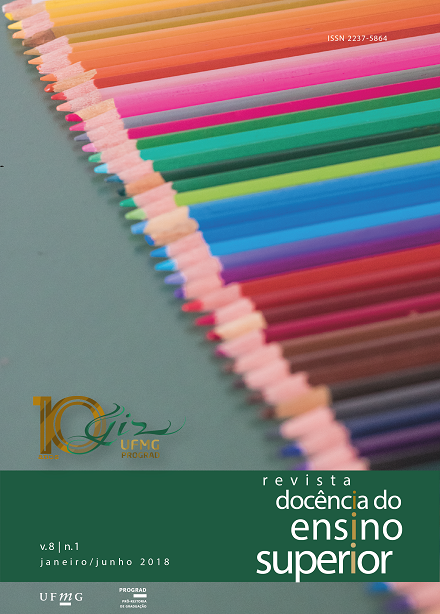Inovação no curso de Enfermagem da UFMG
relatos da implantação de uma disciplina a distância
DOI:
https://doi.org/10.35699/2237-5864.2018.2330Palabras clave:
Ensino a distância, Ética, Bioética, EnfermagemResumen
A busca por conhecimentos na produção de materiais didáticos para a modalidade de educação a distância e habilidades na utilização de ambientes virtuais de aprendizagem motivou o ingresso no Laboratório de Criação de Material Didático para EaD, do Centro de Apoio ao Ensino a Distância da Universidade Federal de Minas Gerais. Este artigo tem como objetivo apresentar algumas reflexões a respeito dos desafios postos ao docente do ensino superior na elaboração de propostas de materiais na modalidade a distância. Em específico, analisa uma proposta de disciplina a distância Ética e Bioética na Enfermagem, elaborada para o curso de Enfermagem, que contou com um processo de reconfiguração teórica e metodológica para ser ofertada nessa modalidade. Como esse tipo de ensino exige adequação da linguagem e inserção planejada de atividades e recursos complementares, experimentou-se uma nova forma de redação, comunicação e troca de conhecimentos com os estudantes.
Descargas
Descargas
Publicado
Número
Sección
Licencia
Los autores que publican en esta revista conservan los derechos de autor y otorgan a la revista el derecho de primera publicación, siendo la obra licenciada simultáneamente bajo la Creative Commons Attribution License, que permite compartir la obra con reconocimiento de autoría y publicación inicial en esta revista.
Los autores están autorizados a asumir contratos adicionales por separado, para la distribución no exclusiva de la versión del trabajo publicado en esta revista (por ejemplo, publicación en un repositorio institucional o como capítulo de libro), con reconocimiento de autoría y publicación inicial en esta revista.
Política de acceso abierto:
La Revista Docência do Ensino Superior es una revista de Acceso Abierto, lo que significa que todo el contenido está disponible de forma gratuita, sin costo para el usuario o su institución. Los usuarios pueden leer, descargar, copiar, distribuir, imprimir, buscar o vincular a los textos completos de los artículos, o utilizarlos para cualquier otro propósito legal, sin necesidad de obtener el permiso previo del editor o autor, siempre que respeten la licencia de uso. los Creative Commons utilizados por la revista. Esta definición de acceso abierto está en línea con la Iniciativa de Acceso Abierto de Budapest (BOAI).



























